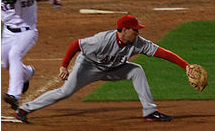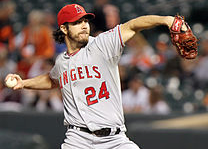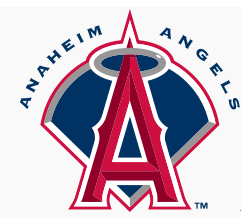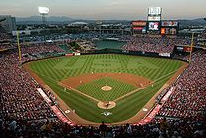
Los Angeles Angels of Anaheim(3)
USINFO | 2013-06-19 11:53
Main article: 2008 Los Angeles Angels of Anaheim season

The Angels had the best record in the American League (tied with the Chicago Cubs for best record in MLB) going into the All-Star Break. On July 20, closer Francisco Rodríguez accumulated 40 saves in 98 team games, becoming the fastest pitcher to accumulate 40 saves since John Smoltz did so in 108 team games in 2003.[citation needed] Rodríguez broke Bobby Thigpen's all-time record for saves in a season on September 13 in a game against the Seattle Mariners and eventually finished with 62 saves.[22]
On September 10, 2008 with a win over the New York Yankees and a loss by the Texas Rangers to the Seattle Mariners, the Angels clinched their seventh American League West Division title. By clinching on September 10, the Angels set a new mark for the earliest clinch date in American League West history.[23] They would finish the 2008 regular season setting a franchise record for wins at 100, breaking the previous club record of 99 wins set by the 2002 World Series championship team. For the second straight year, the Angels faced off against the Boston Red Sox (AL Wild Card) in the ALDS, but were unable to advance, losing the series three games to one.
Main article: 2009 Los Angeles Angels of Anaheim season
Hours after pitching in a game, Nick Adenhart and two friends were killed in a hit-and-run crash. Adenhart's death caused the next day's game to be postponed, and the Angels' April 10 game against theBoston Red Sox became a tribute to Adenhart.[citation needed]
For the third straight year, the Angels faced the Red Sox (the AL Wild Card) in the ALDS. Despite being 0-4 in playoff series against the Red Sox and having lost 12 of the last 13 post-season games against them, the Angels swept the series 3-0. The Angels next faced the New York Yankees in the ALCS, but went on to lose the series four games to two.
2010s
Main article: 2010 Los Angeles Angels of Anaheim season

Although the Angels stormed to a record of 18-9 in the month of June, the team posted three consecutive sub-.500 months from July to September. They ended the season with a record of 80-82, in third place and ten games behind the division champion (and eventually American League champion) Texas Rangers.[citation needed]
Main article: 2012 Los Angeles Angels of Anaheim season
On December 10, 2011 the Angels had the biggest off-season acquisitions in the MLB by signing prized free agents Albert Pujols and C. J. Wilson within the same hour.[citation needed] The two big acquisitions were said to be made by Angels owner Arte Moreno instead of the general manager, who was thought of as funding the newly top paid team with the new 3 Billion dollar T.V. deal the angels made shortly after. Going into the 2012 season the Angels were picked as 8-1 favorites[by whom?] for World Series victors, trailing three other teams.[citation needed] Before the major off-season by the Angels they were picked as 16-1 favorites in the World Series. Despite having the biggest off-season acquisitions the Angels got off to a slow start of 8-15; the slowest start to an Angels season since 2002 when they won the world series. Many eyes were on the slow starting of Albert Pujols', in which April he batted below .220 with 0 home-runs. Many attributed the rest of the seasons success to the call-up of rookie All-Star Mike Trout who became the spark plug for the team batting over .350 most of the season. After Trout's call up the Angels had a drastic change in their record going from 7-15 .318 Win% to 38-20 .655 Win% over the next two months. Also in those two months Angels ace pitcher Jered Weaver would pitch the tenth no-hitter in the Angels MLB history. Despite such success after the first bad month, the Angels chased Texas in the division the whole season, and chased the two wild card spots the last month of the season, but were not able to retain a spot in the playoffs. Rookie sensation Mike Trout ended with one of the greatest rookie campaigns in baseball history with a .326 batting average, 30 home-runs, and led the League in 129 runs scored, 49 stolen bases, 10.7 WAR, WPA, 8.85 RC27, and 171 OPS+. Trout ended up with numerous awards for his effort which included Best Player of the Year by Baseball America, AL MVP by Beyond the Box Score, the official AL Rookie of the Year by BBWAA, and finished 2nd in the official BBWAA AL MVP award.[24][25][26]
The Angels played the first Opening Day Interleague Game in baseball's history on April 1, 2013. The Angels and Reds played in a 1-1 tie up to the top of the 13th inning when Chris Ianetta hit a two-RBI single. Ernesto Frieri close out the game for the win.
Team traditions
Each game begins with the song "Calling All Angels" by Train being played on the P.A.
The Angel Stadium of Anaheim has a section in center field nicknamed the "California Spectacular," a formation of artificial rocks made to look like a desert mountain in California. The California Spectacular has a running waterfall, geysers that shoot in the air, and also shoot fireworks from the rocks before every game; anytime the Angels hit a home run or win a game the fireworks shoot from the rocks as well.[27]
During the seventh inning stretch of every home game, the fans sing along to "Build Me Up Buttercup" by The Foundations.
Angel Stadium of Anaheim is nicknamed "The Big A."[27]
Anytime the Angels win a game, the saying "Light Up the Halo!" is used in reference to the giant landmark which is a big 230 foot tall A with a halo surrounding the top which lights up every time the Angels win a game.[27] Fans also use the saying, "Just another Halo victory," as the late Angels broadcaster Rory Markas, who would say the catch phrase after each win.
The Angels organization created "thunder sticks" when the team made the playoffs. Thunder sticks are now in use by many other sports teams.
Rivalries
The Angels have developed many rivalries in, and outside of their division. They include New York Yankees,[28] Boston Red Sox, Texas Rangers,[29] and Los Angeles Dodgers.
Red Sox - The rivalry between the Red Sox and Angels has developed in heated matchups in regular season and many playoff situations that regularly included fights, late inning rallies, and bad relations. The Red Sox and Angels rivalry dates back to Angels MLB franchise founder Gene Autry making a bet with former Red Sox owner Tom Yawkey that Autry's new expansion team would win more games than Yawkey's Red Sox. In 1964 Angels pitcher Bob Lee suffered a season ending injury of a broken hand after trying to punch a Red Sox fan, which ultimately cost him an ERA title. In 1965 the first of many fights between the two clubs occurred when pitchers Dean Chance and Dave Morehead exchanged hit batters which caused a small 50 man free for all on the field that resulted in the bullpen fence at Dodger stadium being broken down and the riot squad being called. On August 17, 1967 Red Sox all-star outfielder Tony Conigliaro was beaned in the eye by a Jack Hamilton fastball, resulting in vision problems that caused him to miss the final month and a half of that Red Sox pennant winning season as well as the entire next season, and ultimately led to his early retirement.
The most famous Angels playoff collapse was versus the Red Sox in the 1986 ALCS. The Angels were leading Red Sox 3-1 in the series and leading by three runs with two out in the ninth inning and had two strikes on the batter when pitcher Donnie Moore gave up a 3 run home run, and the Red Sox went on to win that game and the next two to win the series. Red Sox followed that series with their own disappointing World Series loss to the New York Mets. Three years later, more personal tragedy struck when Angels pitcher Moore committed suicide. He was said to have not gotten over the "One strike away" game. In recent times, the Angels swept the Red Sox in the 2009 ALDS in Fenway; a devastating loss for Red Sox fans.[30][31]
Rangers - The Rangers and Angels rivalry has been said to develop over a domination in the division between the two teams, and also in recent years more animosity between the two teams due to the amount of former players from each team playing for the division rival. Angels players such as Mike Napoli, Darren Oliver, Vladimir Guerrero, and Texas Players C.J. Wilson and Josh Hamilton are all acquisitions the two division rivals made of former rival players. In 2012 former Texas pitcher CJ Wilson played a joke on former teammate and Mike Napoli in tweeting his phone number, causing Napoli to exchange words with Wilson.[32] The feuds go back to Angels Adam Kennedy and Rangers Gerald Laird arguing leading to punches being thrown multiple times causing small fights between the teams in the past.[33]
Yankees - The Angels and Yankees rivalry can be seen as stemmed through heated play between the two teams through the years, including several times in the playoffs. For the past 20 years the Angels are also the only team in the majors to have a winning record against the Yankees.[34] Coincidental enough, the former PCL Angels were nicknamed "Yankees West" due to the success the team had, and even held multiple scrimmage games between the two in the old Wrigley Field in Los Angeles during spring training throughout the 30s, 40s, and 50s.[35][36]
Dodgers - The rivalry with the Los Angeles Dodgers has been referred to as the Freeway Series because of the freeway system (mostly via the 5) linking the two teams' home grounds.[37] The Freeway Series rivalry developed mostly over the two teams sharing similar regions and fans having been split in LA similar to the Chicago Cubs and Chicago White Sox "Windy City Showdown Rivalry" or the New York Mets and New York Yankees Subway series.
The Rally Monkey
The Rally Monkey is a mascot for the Angels which appears if the Angels are losing a game or if the game is tied during the 7th inning, but sometimes earlier depending on the situation. The Rally Monkey appears on the scoreboard in various movies or pop culture references that have been edited to include him.[citation needed]
The Rally Monkey was born in 2000 when the scoreboard showed a clip from Ace Ventura: Pet Detective, after which the Angels rallied to win the game. The clip proved to be so popular that the team hired Katie, a white-haired capuchin monkey, to star in original clips for later games. When seen, she jumps up and down to the House of Pain song "Jump Around" and holds a sign that says "RALLY TIME!"
The rally monkey came to national and worldwide attention during the Angels' appearance in the 2002 World Series, again against the San Francisco Giants. In the 6th game, the Angels were playing at home, but were trailing the series 3-2 and facing elimination. They were down 5-0 as the game entered the bottom of the 7th inning. Amid fervid rally-monkey themed fan support, the Angels proceeded to score six unanswered runs over the next two innings, winning the game and turning the momentum of the series for good (they went on to clinch the championship in game 7).[38]
From 2007 to 2009, the Angels reached the post-season each year, sparking a renewal of the rally monkey's popularity.[38]
Fan support
The many traditions at Angel Stadium i.e. (Rally Monkey, Break out the red, the big A), and fan made sites such as Halos Heaven, Halo Space, Rally Monkey, Angelswin.com, and Charlie’s Angels show the passion and support fans have for the Angels.[27][39]
The Angels have drawn 3 million plus fans to the stadium for ten years straight, and at least 2 million for 29 seasons, and a game average in 2010, 2011, & 2012 of 40,000 fans at each game despite not making the playoffs the past three years.[40] In 2011, the Angels had the fifth best home attendance in Major League Baseball, averaging 39,090 fans per game.[41]
In 2009, the Angels were voted the number one franchise in professional sports in Fan Value by ESPN magazine.[42] In 2011, ESPN & Fan polls by ESPN ranked the Angels #4 in the best sports franchises in all of sports, ahead of every Major League team in baseball at #1 and also making it the #1 sports franchise in Los Angeles. The rankings were determined through a combination of sports analysts and fan votes ranking all sports franchises by a combination of average fan attendance, fan relations, "Bang for your Buck" or winning percentage over the past 3 years, ownership, affordability, stadium experience, players effort on the field and likability, coaching, and "Title Track".
Logos and colors

The Los Angeles Angels of Anaheim have used ten different logos and three different color combinations throughout their history. Their first two logos depict a baseball with wings and a halo over a baseball diamond with the letters "L" and "A" over it in different styles. The original team colors were the predominately blue with a red trim. This color scheme would be in effect for most of the franchise's history lasting from 1961–1996.
In 1966, after the club's move to Anaheim, the team name changed from the "Los Angeles Angels" to the "California Angels," along with the name change, the logo changed as well. During the 31 years of being known as the "California Angels," the team kept the previous color scheme, however, their logo did change six times during this period. The first logo under this name was very similar to the previous "LA" logo, the only difference was instead of an interlocking "LA," there was an interlocking "CA." Directly after this from 1971–1985, the Angels adopted a logo that had the word "Angels" written on an outline of the State of California. Between the years 1971–1972 the "A" was lower-case while from 1973–1985 it was upper-case.
It was in 1965, while the stadium was being finished, that Bud Furillo (of the Herald Examiner) coined its nickname, "the Big A" after the tall letter A that once stood beyond left-center field and served as the arena's primary scoreboard (it was later relocated to a section of the parking lot, south-east of the stadium).

In 1986, the Angels adopted the "big A" on top of a baseball as their new logo, with the shadow of California in the background. After the "big A" was done in 1992, the Angels returned to their roots and re-adopted the interlocking "CA" logo with some differences. The Angels used this logo from 1993–1996, during that time, the "CA" was either on top of a blue circle or with nothing else.
After the renovations of then-Anaheim Stadium and the takeover by the Walt Disney Company, the Angels changed their name to the "Anaheim Angels" along with changing the logo and color scheme. The first logo under Disney removed the halo and had a rather cartoon-like "ANGELS" script with a wing on the "A" over a periwinkle plate and crossed bats. With this change, the Angels' color scheme changed to dark blue and periwinkle. After a run with the "winged" logo from 1997–2001, Disney changed the Angels's logo back to a "Big A" with a silver logo over a dark blue baseball diamond. WIth this logo change, the colors changed to the team's current color scheme: predominately red with some dark blue and white.
When the team's name changed from the "Anaheim Angels" to the "Los Angeles Angels of Anaheim," the logo changed only slightly, the name "ANAHEIM ANGELS" and the blue baseball diamond were removed leaving only the "big A."
For the 2011 season, as part of the 50th anniversary of the Angels franchise, the halo on the 'Big A' logo temporarily changed colors from silver to old gold, paying tribute to the Angels logos of the past. The uniforms also reflected the change to the gold halo for this season. During the 50th Anniversary season the players have worn throwback jerseys at each Friday home game reflecting all the different logos and uniforms previously worn by players. Also Angels alumni from past season during the 50th year throw out the first Angels pitch at every home game.
A new patch was added on the uniforms before the 2012 season, featuring a red circle encircling the words "Angels Baseball" and the club logo inside and flanking the year 1961 in the middle, which was the year the Angels franchise was established.
Radio and television
Main article: List of Los Angeles Angels of Anaheim broadcasters
As of 2009, the Angels' flagship radio station is KLAA 830AM, which is owned by the Angels themselves. It replaces KSPN (710 ESPN), on which frequency had aired most Angels games since the team's inception in 1961. That station, then KMPC, aired games from 1961 to 1996. In 1997 & 1998, the flagship station became KRLA (1110AM). In 1999, it was replaced by KLAC for four seasons, including the 2002 World Series season.
The Angels 2010 broadcast line-up was thrown into doubt with the death of Rory Markas in January 2010. The Angels had announced in November 2009 that Markas and Mark Gubicza would broadcast Angels' televised games, with Terry Smith andJosé Mota handling the radio side.[43] At the same time, the Angels announced that Steve Physioc and Rex Hudler would not return to the broadcasting team. On March 3, 2010 it was announced that Victor Rojas will replace Markas.[44]
In 2008, KLAA broadcast spring training games on tape delay from the beginning on February 28 to March 9 because of advertiser commitments to some daytime talk shows. Those games were available live only online. Live preseason broadcasts were to begin on March 10.[45]
In 2009, KFWB 980AM started broadcasting 110 weekday games, including postseason games, to better reach listeners in Los Angeles County and other areas to the north.[46] All 162 games plus post season games still air on KLAA.
In 2010, KSPN 710AM will broadcast at least 60 weekday games. This will be a partial return to their old station from 2007.[47]
Angels radio broadcasts are also in Spanish on KWKW 1330AM and KWKU 1220AM.
Fox Sports West holds the exclusive rights to the regional telecasts of approximately 150 Angels home and away games.[48] Fox owned and operated MyNetworkTV affiliate KCOP broadcasted select games from 2006 to 2011, but opted to move those games to Fox Sports West in 2012. Select national Angels telecasts can be found on Fox, ESPN, TBS or MLB Network.
During the 2009 season, Physioc and Hudler called about 100 games, while Markas and Gubicza had the remaining game telecasts (about 50, depending on ESPN and Fox exclusive national schedules). The split arrangement dated back to the 2007 season, when Mota and Gubicza were the second team. Markas debuted on TV in a three-game series at the Toronto Blue Jays in August 2007.
Mota, who is bilingual and the son of former Dodger Manny Mota, has also called Angels games in Spanish, and at one time did analysis from the dugout rather than the usual booth position.
All games are produced by FSN regardless of the outlet actually showing the games.
Dick Enberg, who broadcast Angels baseball in the 1970s, is the broadcaster most identified with the Angels, using such phrases as "Oh, my!", "Touch 'em all!" after Angel home runs, and "The halo shines tonight!".
Other former Angels broadcasters over the past three decades include Dave Niehaus, Don Drysdale, Bob Starr, Joe Torre, Paul Olden, Al Wisk, Al Conin, Mario Impemba, Sparky Anderson, Jerry Reuss, Ken Wilson, Ken Brett, and Ron Fairly. Jerry Coleman also spent time with the Angels organization in the early-1970s as a pre-game and post-game host before joining the San Diego Padres broadcast team.
From 1994 until the end of the 2012 season, the public address announcer for most Angels home games was David Courtney, who also has held also the public address announcer for the Los Angeles Kings and Los Angeles Clippers and a traffic reporter for Angels flagship KLAA 830 AM until his death on November 29, 2012,[49] but when there is a scheduling conflict with Kings, Clippers, and Angels home games, Phil Hulett is the secondary public address announcer. Starting in the 2013, Michael Araujo is the public address announcer.
Film
Parent company Disney remade the 1951 film Angels in the Outfield in 1994 with the California Angels as the team that receives heavenly assistance. The team is also featured in the 1988 comedy film The Naked Gun. The 1990 comedy Taking Care of Business features a world series matchup between the Chicago Cubs and the California Angels. The 1991 movie Talent for the Game features Edward James Olmos as a baseball scout for the California Angels.
Awards and honors
See also: Los Angeles Angels of Anaheim award winners and league leaders
Retired numbers
• #26 was retired for Gene Autry to indicate he was the team's "26th Man" (25 is the player limit for any MLB team's active roster, except in September)
• #42 was retired throughout Major League Baseball in 1997 to honor Jackie Robinson.
Angels Hall of Fame
| Player | Bobby Grich | Jim Fregosi | Don Baylor | Rod Carew | Nolan Ryan | Jimmie Reese | Brian Downing | Chuck Finley | Gene Autry | 2002 World Series Team |
| Year Inducted | 1988 | 1989 | 1990 | 1991 | 1992 | 1995 | 2009 | 2009 | 2011 | 2012 |
Baseball Hall of Fame
As of the 2011 Hall of Fame election, no inducted members have elected to be depicted wearing an Angels cap on their plaque. However, several Hall of Famers have spent part of their careers with the Angels:[51]
| Los Angeles Angels of Anaheim Hall of Famers | ||||||||||||||||||
| Affiliation according to the National Baseball Hall of Fame and Museum | ||||||||||||||||||
California Angels
{{{Footnote5}}} |
Ford C. Frick Award recipients
Minor league affiliations
| Level | Team | League | Location |
| AAA | Salt Lake Bees | Pacific Coast League | Salt Lake City, UT |
| AA | Arkansas Travelers | Texas League | North Little Rock, AR |
| Advanced A | Inland Empire 66ers | California League | San Bernardino, CA |
| A | Burlington Bees[52] | Midwest League[52] | Burlington, IA[52] |
| Rookie | Orem Owlz | Pioneer League | Orem, UT |
| AZL Angels | Arizona League | Tempe, AZ | |
| DSL Angels | Dominican Summer League | San Pedro de Macorís, Dominican Republic |
Historic minor league farm teams (with partial affiliation contracts) of the Angels system in the state of California were: The triple-A San Diego Padres later the Hawaii Islanders, and the class-AAA/class-A Long Beach Angels whom became the Seattle Angels, Salinas Angels (1972–75), Santa Clara Angels (1976–79), Redwood Pioneers of Sonoma County (1980–85), Palm Springs Angels (1986–93), Lake Elsinore Storm (1994-2001/05) and Rancho Cucamonga Quakes (2002/06-11).
Share this page



















